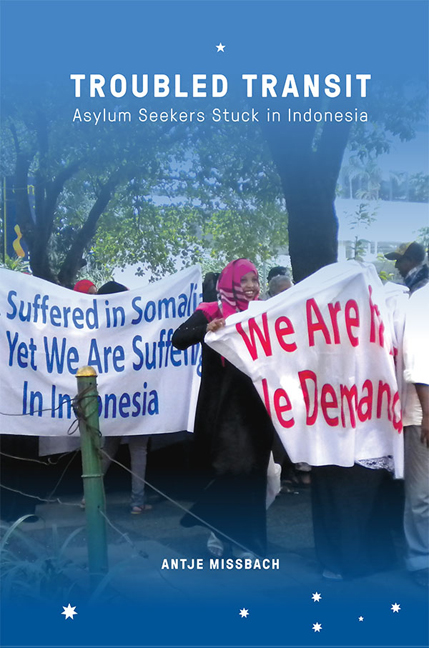Book contents
- Frontmatter
- Contents
- List of tables
- Acknowledgements
- Map of Indonesia
- Acronyms and Initialisms
- 1 Introduction
- 2 Transiting Indonesia: Past and Present
- 3 The Politics of Detention
- 4 Life on Hold
- 5 The Limits of Protection
- 6 Indonesia as a Transit State: Obligations, Policies, and Practice
- 7 Tidal Ebb and Flow: The Indonesia-Australia Relationship
- 8 Selling Hope
- 9 Conclusion
- Bibliography
- Index
- About the Author
6 - Indonesia as a Transit State: Obligations, Policies, and Practice
Published online by Cambridge University Press: 19 May 2017
- Frontmatter
- Contents
- List of tables
- Acknowledgements
- Map of Indonesia
- Acronyms and Initialisms
- 1 Introduction
- 2 Transiting Indonesia: Past and Present
- 3 The Politics of Detention
- 4 Life on Hold
- 5 The Limits of Protection
- 6 Indonesia as a Transit State: Obligations, Policies, and Practice
- 7 Tidal Ebb and Flow: The Indonesia-Australia Relationship
- 8 Selling Hope
- 9 Conclusion
- Bibliography
- Index
- About the Author
Summary
All expenses related to residence and living costs of
illegal immigrants while undergoing status determination process
or being under the protection of the UNHCR, are not the
responsibility of the Immigration Office, Regional Office Ministry of
Justice and Human Rights, or the Directorate General of Immigration.
(Regulation of the Director General of Immigration No. IMI-1489. UM.08.05 2010: §6)
Amongst transit migrants I spoke with, the level of their prior knowledge about Indonesia and the conditions that awaited them there seemed to be low. One young man said he had never heard of Indonesia until a potential smuggler explained to him the advantages of going through Indonesia to reach Australia. In hindsight, he realized that much of what the smuggler had told him was either half-true or entirely wrong. Having to make impromptu decisions about why and where to go, in the midst of political turmoil in their homelands where they lack access to reliable information, means that many transit migrants are surprised by the environment and circumstances they face once they reach Indonesia. Unsurprisingly, they are not well prepared for their stay in transit, which is often much longer than anticipated. Many transit migrants I conversed with seemed astonished on their arrival in Indonesia by everything from the climatic conditions to the archipelago's geographical configuration. For Tariq, who was introduced in Chapter 3, “[i]t was my first time in countries like Thailand, Malaysia or Indonesia and I worried a lot because I did not know anything about those countries”. All that Tariq knew about Indonesia came from a documentary about Bali he had once watched on TV. While he was “pleasantly surprised” on his travels through Thailand and Malaysia, Tariq's disappointment with Indonesia and its visible poverty led him to comment, “I thought there were only beggars in Pakistan and India”.
One of the migrants’ most significant misapprehensions is the belief that Indonesia does not care much about transit migrants and allows them to travel through to Australia unhindered. Although that was the case in the early 2000s, Indonesia has since strengthened its efforts to control the movement of transit migrants into and out of the country and to restrict the operations of people-smuggling networks. This does not mean, however, that intensified law enforcement measures have been entirely successful in stopping an increase in the flows through Indonesia.
- Type
- Chapter
- Information
- Troubled TransitAsylum Seekers Stuck in Indonesia, pp. 149 - 176Publisher: ISEAS–Yusof Ishak InstitutePrint publication year: 2015

